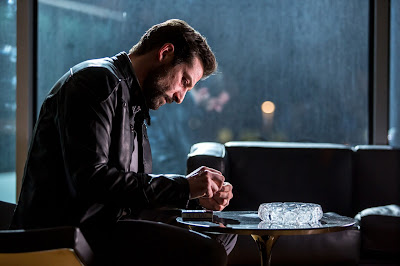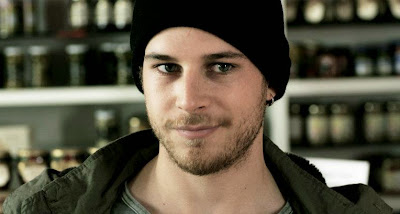Note: This excellent film is now available
-- as of September 2019, at least -- via Amazon Prime
The original Italian title of TAINTED SOULS -- a new drama about a neighborhood, bisexuality, drugs, money and power -- is Il contagio, which translates, as you might guess, to The Contagion. Perhaps that sounded like too much of a sci-fi thriller for proper international distribution, but it makes a much better (and less pompous) title than Tainted Souls There is nothing at all pompous about this beautifully wrought and gorgeously written exploration of love (mostly unrequited), loss, and life among Italians trying so hard to better themselves with little hope of actually achieving this.
The films directing duo -- Matteo Botrugno and Daniele Coluccini (shown above, with Signore Coluccini on the left) -- also wrote the film, with some help from one of its stars, Nuccio Siano, who plays (and very well) Carmine, the major villain of the piece. One of the many characters in this tale of a Rome neighborhood, which looked to me maybe lower-but-still-striving-middle-class, is a successful novelist in the midst of an affair with a 40-year-old body builder, Marcello (Vinicio Marchioni, below), who is married to a woman who loves him, even if they rarely, if ever, have sex. Marcello's main goal is going to the gym and keeping that still-beautiful body in shape.
His writer/lover, called The Professor, and played to perfection by Vincenzo Salemme (shown below, center), sort of narrates the film. It is his words we hear at the beginning, and again those same words at film's end. Yet what a difference that second time around! If you are not moved to tears or perhaps experience a kind of catharsis at all you have seen and what it has meant, as those words resonate again, I shall be very surprised.
In the midst of the film, the professor speaks at length of what Marcello means to him, and the words are perhaps the most beautiful and moving I've ever heard expressed about "the love object." If this is not art, I don't know what is. I was certain at this point that the movie must have been based on a novel, with this portion of dialog taken word-for-word from the source. Evidently not. We have one, two, maybe all of the three co-writers to thank, as well as Signore Salemme's beautiful delivery of those words. (My mistake: Upon a second viewing of Tainted Souls, during the end credits, I found that the film is indeed based upon a novel, Il Contagio, written by Walter Sitti. I hope Signore Sitti was pleased with the film version.)
We also get to know a number of other tenants of the building and experience a peek into their lives, some of which are sad indeed (a robbery and fur coat figure into things). In the second half (there's a Three Years Later title card), the film turns its attention from Marcello to the character of Mauro (Maurizio Tesei, below), who plays second-in-command to Carmine's crime lord.
Mauro has earlier been instrumental in saving Marcello from the wrath of Carmine (Signore Siano, shown below). It is not clear if there may be a sexual attraction between Mauro and Marcello or simply the chance for a special and perhaps deep friendship.
Instead we get a good dose of everything from philosophy and religion to economics, politics and class (there are divergences in that latter category, it seems, even among the criminal set). Finally, as the end credits roll, we feel that we've lived with and loved these people. We understand them, suffer with them, and feel deeply their humanity -- even, in some cases, when there is almost nothing of it that remains.

From Breaking Glass Pictures, running 112 minutes and in Italian with English subtitles, Tainted Souls makes its home video debut tomorrow, Tuesday, July 24, on DVD and VOD -- for purchase and/or rental.













































